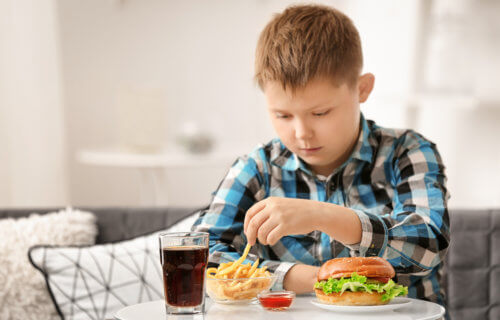PHILADELPHIA — New research from a team at the University of Southern California is giving entirely new meaning to the phrase “happy meal.” Scientists say emotions play a rather large role in determining unhealthy adolescent eating habits, especially during the weekends.
“Children are more likely to consume unhealthy foods on weekends when meals and snacks are less structured and supervised than on school days,” says Christine Hotaru Naya, MPH, from USC’s Department of Population and Public Health Sciences, in a media release. “We also focused on snack choices where children often make their own decisions.”
Researchers sampled 195 ethnically diverse children currently enrolled in the third through sixth grades living in the greater Los Angeles metropolitan area. The team contacted the kids seven times daily using a mobile app to answer questions. These mobile polls asked each participant if they were feeling stressed, mad, or sad, and also asked about any unhealthy eating choices over the prior two hours. This included consuming fried foods, sweets, and sugary beverages.
Sweets are the biggest treat kids go to when feeling bad
Across all of these choices, children reported eating sweets most often. Over 40 percent of the study period, the kids ate at least one sweet or pastry daily. Similarly, they consumed chips or fries at least once per day nearly 30 percent of the time and consumed sugary drinks at least once daily 25 percent of the time.
Notably, the team observed three distinct negative mood patterns throughout the course of a child’s day: stable low, early increasing/late decreasing, and early decreasing/late increasing. On most days (90%), children reported a stable low negative mood, with moods varying widely for the remaining 10 percent.
“We found fried food consumption to be higher on days with more variable emotional patterns than days with consistent low negative mood,” Naya explains. “These results align with other studies that have found the negative mood to positively predict children’s fatty food intake.”
However, sweet foods and soda consumption did not adhere to the same patterns.
“This study has several strengths, including the ability to be repeated in the family home, and we were able to test a population of healthy children so results can be widely applied,” adds study co-author Daniel Chu, MPH, from USC’s Department of Population and Public Health Sciences.
Mornings and evenings are the key times
In conclusion, study authors say their findings lend further credence to the notion that both mood and emotions should be a consideration when attempting to improve a child’s eating habits. More specifically, researchers point to mornings and evenings in particular as times in which kids may be more vulnerable to negative emotions and then make poor food choices.
“More studies are needed for us to understand the relationship between a child’s emotions and their food choices, but this is a good start on that path to recognizing how to approach food choices with a person’s mood and emotions in mind,” Naya concludes. “We could improve our current interventions to be individually tailored to the environmental, social, emotional, and cognitive contexts in which unhealthy eating occurs.”
The study is published in the Journal of Nutrition Education and Behavior.


Fat kids using food like a drug learn this from their inept parents.
Who is bringing this food garbage into the home? And who is teaching their kids that instead of dealing with life, you ignore and deny reality, shrug off personal responsibility and just do what feels good.
This is our culture today and why we’re getting fatter and fatter with increased emotional problems.